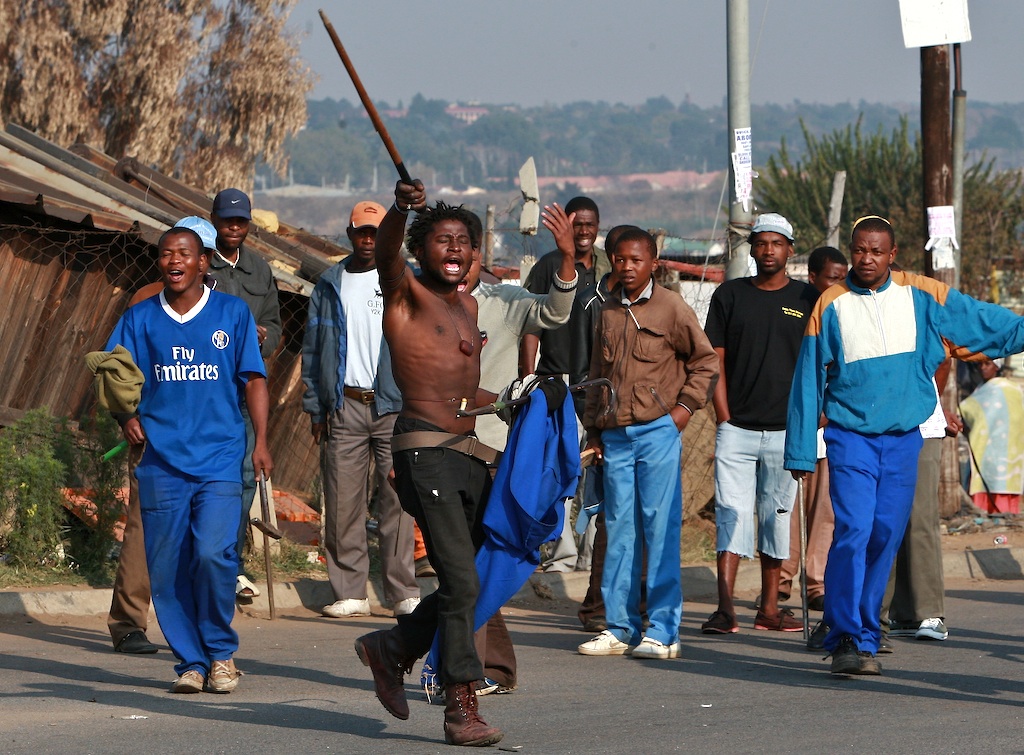In the depths of an unusually cold winter, the poor, feeling increasingly marginalized economically, socially and politically, and the government seemingly unwilling to listen, let alone act, are seeing protest as the only viable alternative.
"It's like violence is the only thing the government listens to," Adele Kirsten, executive director of the Centre for the Study of Violence and Reconciliation (CSVR), told IRIN.
"This is worrying but not surprising," Kirsten said. Service delivery backlogs and related protests had long been common in South Africa, but the sudden surge since the beginning of July and the high levels of violence had been exceptional.
By 23 July the media had reported widespread violent protests in the provinces of Mpumalanga, Gauteng, North West and Western Cape over poor access to housing, electricity, water and health care.
Although the country has made some progress in improving housing and access to utilities like clean water, hundreds of thousands of people still live in abject poverty in vast shantytowns, and many expressed their anger and disappointment in clashes with police, burning tyres and throwing stones at passing vehicles.
An inherited problem is still a problem
The election in April of President Jacob Zuma - hailed as 'a man of the people' - brought "high levels of expectation and excitement", and the popular hope was that Zuma and the African National Congress (ANC), which has held power since 1994, would now "translate rhetoric into practice", so the poor would find representation and sympathy for their plight, Kirsten said.
Community-level government officials, often viewed as self-serving and inherently corrupt, have left much undone; people have felt excluded from political decision-making, their predicament unheard, their needs unmet.
"Before the election you see the councillors; after the election they just vanish. They promise us something and thereafter disappear; there is no one to talk to about what is going on here [where we live]," Mthembe said.
Loren Landau, Director of the Forced Migration Studies Programme at the University of the Witwatersrand, commented: "Where councillors are afraid to visit the communities they represent, and members of parliament (MPs) are chosen by the ANC's executive committee with little popular consultation, it is little wonder that people resort to violence to draw attention to their concerns."
A vicious circle
In Landau's view, "What's going on now reflects two governance challenges that have gone unaddressed for too long: the first is less about service delivery than about managing expectations, and encouraging people to express their grievances (legitimate or otherwise) peacefully through community or political institutions."
The second concerned the treatment of non-nationals in contentious communities, and a growing fear that violent protesters would increasingly target foreigners, often blamed for "stealing" jobs, women and houses.
The xenophobic violence that swept through South Africa in 2008 - killing at least 62 people and displacing 100,000 others - would return if nothing was done to address its root causes.
"Many people will say we learned no lessons from last year's violence. I would disagree. What we have learned is that you can assault, extort, rob, or murder non-nationals without facing any consequences," Landau warned. Xenophobic incidents occurred during July 2009 in the town of Balfour, Mpumalanga Province.
Official reaction to the latest violence has been disappointing, raising fears that protesting South Africans would become further alienated from their government: "So far there has been no clear political response to this," said CSVR's Kirsten.
Instead of real engagement, police fired rubber bullets and teargas in a crackdown on protesters, while politicians expressed scant tolerance for their grievances, perceived by many as legitimate.
"We cannot allow anybody to use illegal means to achieve their objectives. Anything that is done must be done within the law and constitution," the Minister of Co-operative Governance and Traditional Affairs, Sicelo Shiceka, said on Talk Radio 702, a local radio station.
This does not offer much hope to the cold and desperate people in Thokoza. Dudu Ntomo, who has spent most of her life in the shantytown, told IRIN: "It just goes round and round here, nothing changes - there's no toilet, no tap, no houses – this place is just not right."
tdm/llg/he
This article was produced by IRIN News while it was part of the United Nations Office for the Coordination of Humanitarian Affairs. Please send queries on copyright or liability to the UN. For more information: https://shop.un.org/rights-permissions



